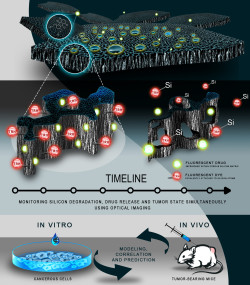Feb 13 2015
A team of Israeli and American researchers have found that silicon nanomaterials used for the localized delivery of chemotherapy drugs behave differently in cancerous tumors than they do in healthy tissues. The findings could help scientists better design such materials to facilitate the controlled and targeted release of the chemotherapy drugs to tumors.

The joint study, published today in Nature Communications, was conducted at the Technion-Israel Institute of Technology, Massachusetts Institute of Technology (MIT) and the Harvard Medical School.
“We have shown for the first time that biomaterials in general, and nanostructured porous silicon in particular, behave differently when they are injected (or implanted) at the tumor microenvironment,” said lead researcher Professor Ester Segal, of the Technion Faculty of Biotechnology and Food Engineering. In recent years, Prof. Segal’s lab has successfully engineered silicon “containers” (carriers) that are used to release anticancer drugs in a controlled manner. Nanostructured porous silicon is the common name for a family of silicon-based materials containing nano-scale holes.
The study investigated the behavior of these containers in breast cancer tumors, and showed increased degradation of the silicon material in the diseased area. Specifically, the findings showed that reactive oxygen species upregulated in the cancerous environment (in vivo) induce the oxidation of the silicon, causing a rapid degradation of the containers when compared with (in vitro) lab experiments.
These insights about the process of nanostructured silicon degradation at the tumor microenvironment could allow for early and smart design intervention of the silicon structure to facilitate controlled release of the drug at the targeted site. The research team is now working to determine and predict material fate in vivo under specific environments. Being able to do so would lead to faster and successful clinical translation, says Prof. Segal.
The nanostructured porous silicon material is a promising drug delivery vehicle, mainly due to the following unique characteristics: a large surface area (geared for drug unloading), biocompatability, and bio-degradability in a safe and non-toxic manner. In recent years, Prof. Segal and her doctoral student Adi Tzur-Balter developed 'containers' (carriers) for the delivery of anticancer drugs. Through careful design of the silicon containers, in terms of their pore diameter and surface chemistry, the group achieved optimal features for effective drug delivery.